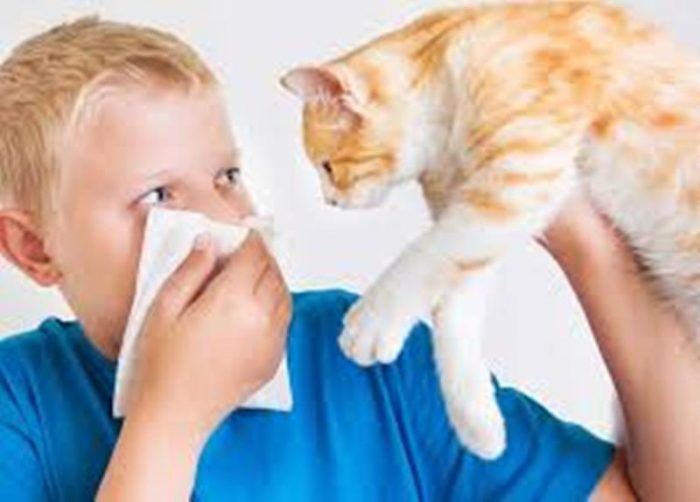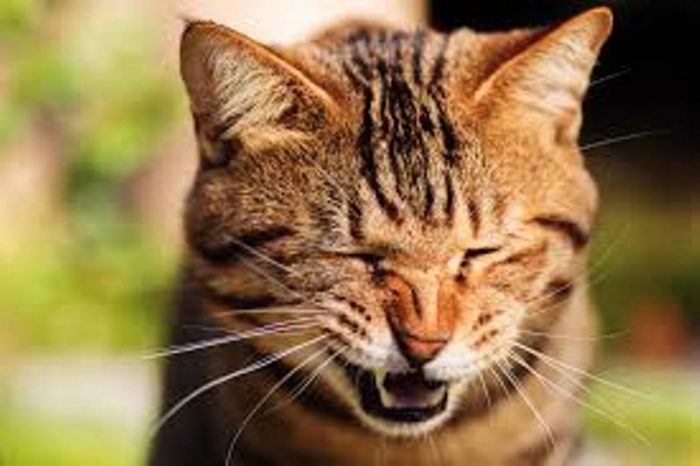Sneezing is a natural phenomenon that involves the autonomous expulsion of air from the nostrils. As a result of this, we encounter people sneezing literally every day and, as such, develop mechanisms to protect ourselves and our loved ones from it. However, while we might be knowledgeable about sneezing among the human population, studies show that the majority of cat owners lack the required knowledge needed to take care of a sneezing cat and oftentimes think that cat sneezing is a perfectly normal occurrence; thus, deciding to do nothing until the situation worsens.
In a bid to tackle this ignorance, it is imperative that cat owners are well-read as regards what causes cats to sneeze, after which they would be able to formulate the best measures needed to help their sneezing cat.
Table of Contents
Why Is My Cat Sneezing?
Cat sneezing seems to be a problem most of the time and attention must be paid to it. The following are some of the reasons why a cat would suddenly start sneezing.
Foreign Particles
On a planet with over 7 billion people, human activities like farming, mining, excavation, deforestation, quarrying, and burning of fossils are necessary for the survival of the human race. Despite their importance, such activities constitute a major source of pollution in the environment. A major cause of sneezing in cats is a result of foreign particles or pollutants like dirt, pollen, smoke, and dust, which tend to block the nostrils; thus, making its body swing into full action all in a bid to clear the nose. Remember, all these pollutants emanate from industrial activities by man.
Irritation
Time for some facts; do you know that the cat’s sense of smell is about 20 times stronger than that of humans? What this simply means is that the cat’s nose is highly sensitive. As a result of this sensitivity, strong odors and smells are known to affect them in a negative way; thus, triggering sneezing. Some examples of irritants that are known to provoke a cat’s nose are bleach, vinegar, perfume, fumigant, and the smell of strong spices while cooking. Once a cat is exposed to any of these irritants, sneezing naturally follows.
Respiratory Infection
Sneezing in cats most times is associated with a cold, which is caused by upper respiratory tract infection often as a result of infections like feline calicivirus and feline herpesvirus, which so happens to be very contagious among cats. Hence, it is paramount that your cat receives regular vaccines to help protect it from these viral diseases that are capable of making it sneeze. Other types of viruses that are capable of causing sneezing in cats include the likes of Feline Immunodeficiency Virus (FIV), feline leukemia chlamydia, and several others.
Intranasal Vaccines
Yes, you read properly, even trying to treat respiratory infections in cats can lead to sneezing. But the sneezing is only expected to last for a couple of days, and this is a result of the fact that vaccines contain chemicals, that the body of your cat isn’t familiar with. These vaccines, in turn, prompt some reactions from your feline companion, which are mostly realized as sneezing. Overall, cat sneezing is one way the felines export toxins from the body.
The Side Effects Of Sneezing In Cats
There are several symptoms that may accompany sneezing in cats; oftentimes, these symptoms are a result of infections and irritations. The following are some of such symptoms that follow cat sneezing;
- fever
- A decrease in appetite will eventually lead to loss of energy and consequently weight loss
- Enlargement of lymph nodes
- Coughing and wheezing
- Shortness of breath or breathing difficulty
- Tongue ulcers
- Diarrhea
- Foul breath
- Bleeding from the nose
- Sluggishness – a lack of liveliness and the cat may likely show little or no interest in doing all the things it used to enjoy
Cat Sneezing: Can My Cat Catch A Cold?

People catch a cold as a result of exposure to viruses such as rhinovirus, parainfluenza virus, or respiratory syncytial virus. Such types of viruses can be categorized as zoonotic diseases (diseases that can be spread from humans to pets). That being said, it is possible that a cat may be able to catch a cold, although the probability is very low.
As such, it is best that you, as a cat owner, adopt good hygienic practices before and after handling your cat so as to further decrease the possibility of passing your cold onto your cat. Besides, pet owners who are already displaying the symptoms of these kinds of ailments should maintain a safe distance from their four-legged friends until they are back to normal.
Read Also: How To Treat A Cat Abscess
How To Take Care Of Your Cat When It Catches Cold
The following are some of the effective ways to take care of a cat that has a cold.
1. Ensure they have access to clean drinking water at all times as water helps loosen secretions, which increases blood flow and food absorption. A cat that ingests enough water will handle the condition better than the one that survives on little fluid.
2. Offer them a variety of food so as to enable them to have enough nutrients to replenish lost weight. Now, you may need to try the food that they have never taken before in other to rekindle their appetite. However, we must remember to seek the opinion of a professional before any change in diet can be made.
3. Keep your cat warm and dry at all times. During cold weather, ensure you have the heater in the house turned on so as to regulate the temperature. If your cat goes outside sometimes, ensure that it is not during the rains and snow. You can only allow them outdoors when the sun is shining.
4. If you have other healthy cats in the house, you might isolate the cat with a cold by keeping it in a separate room all by itself and providing all the resources it needs to have a speedy recovery. This is in a bid to stop the virus from spreading to other household pets.
5. If you have carried out the aforementioned measures and your cat doesn’t seem to be showing signs of progress, it is best you consult a professional veterinarian who will conduct tests and physical exams to rule out more serious ailments.
